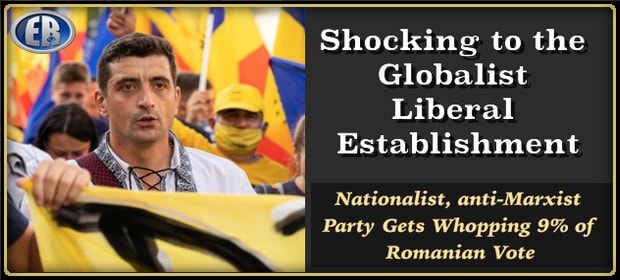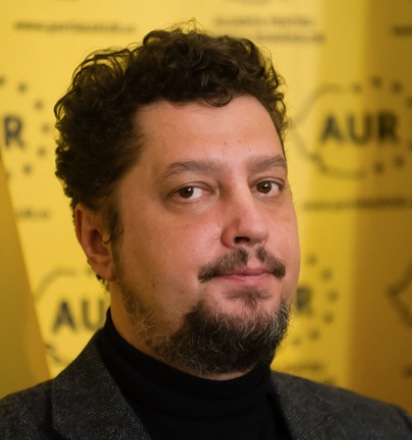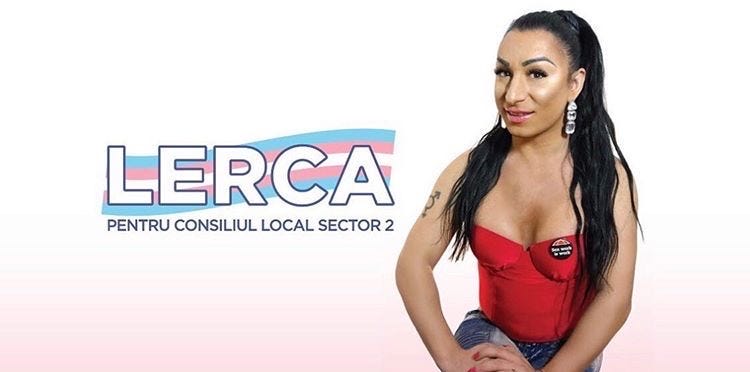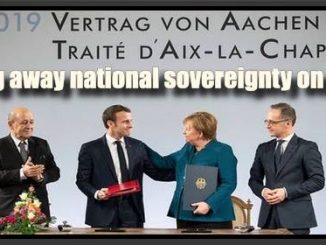
ER Editor: It’s worth checking out the map below to see the landmass of EU countries that aren’t buying into the globalist, liberal, hate-the-ordinary-person political philosophy of western Europe, e.g. Poland, Hungary, Slovakia, Romania, Bulgaria, etc.
Guillaume Durocher in the article below reveals that the newly surging Romanian nationalist party, Alliance for Romanian Unity, which won almost 9% of the vote in the Dec.6 2020 legislative elections and counts a large number of young people among its supporters, has fans in Germany and Belgium, too.
The sudden rise of this movement as a political force was picked up today by FreeWest Media. See Romania: meteoric rise of a new ‘far-right’ party.

********
Romania Strikes GOLD: Nationalists Break Through with 9% of Vote in Parliamentary Elections
GUILLAUME DUROCHER
Over a century after Marx, a specter is indeed haunting Europe: the specter of nationalism.
For the latest proof, we turn to Romania, where a new nationalist party has burst into parliament with 9% of the vote. Romanian liberals, who very much form a minority sensibility in the country, are in shock at the nationalists’ surprise breakthrough. Indeed, it seems few people saw it coming: prior to the elections, AUR was barely noticed even by the popular nationalist website Incorect Politic. Much as France is an important indicator of trends in Western Europe, so Romania with its almost 20 million inhabitants is significant for Eastern Europe and in particular the Balkans.
This party is called the Alliance for Romanian Unity, whose acronym AUR means GOLD in Romanian. The organization, led by the 34-year-old street activist George Simion and the traditionalist journalist Claudiu Târziu, has managed to strike a balance between uniting a diverse of coalition of right-wing supporters and presenting a reassuring image to the general public. This coalition includes nationalists, Orthodox Christians, philosophical Rightists, and opponents of the anti-COVID lockdowns in Romania.
AUR’s logo is indicative: a map of Romania, the eastern border suggestively superimposed by the stars of the European Union. The message? We are a responsible, pro-European party – important given how many Romanians work in the EU or have benefited from EU funds – and we wish the neighboring country of Moldova to rejoin Romania. Indeed, the recent centennial of Romanian unity, the nation was fully unified in 1919 in the wake of the First World War, was widely celebrated throughout the country. Reunification with Moldova, a poor country of 2 million souls, then seems natural to Romanians, even if the goal is rarely actively pursued.
Why did AUR break through?
It is not completely clear why AUR was able to break through while remaining under the radar for much of the media. George Simion, who has been active in public causes for many years, had crisscrossed the country visiting localities since July in the “Golden Caravan,” a sleek bus. Attention was also brought by party member Diana Șoșoacă’s street protests against lockdown measures. The party also evidently did well on social media. Simion’s Facebook page now has 428,500 likes and 617,500 followers. AUR voters are young (45% between 18 and 35) and less educated (8% university graduates).
The previous parliamentary elections had seen the breakthrough of the liberal-globalist Union to Save Romania (USR, analogous to the Macronist tendency in France), who had done particularly well with educated Romanians abroad, on an anti-corruption platform. In 2016, USR received 8.9% of the vote and they have more than consolidated their position by winning 15.4% in 2020. This time, however, many have been surprised to learn that AUR also did well in the diaspora, seemingly from the hundreds of thousands of Romanians abroad working in farming, construction, and other blue-collar work. Indeed, the “AUR in Germany” Facebook group has over 17,500 members and AUR was competitive with, or even received more votes than, USR in many cities in Belgium.
Romanians abroad are generally politically rather inert. Many rise through the ranks of their new homes, however, (e.g., among countless cases, the current French minister of sports, Roxana Mărăcineanu) and diaspora networks, liberal or conservative, are eager to use their considerable resources to influence and do good in the home country. Empty Catholic churches in the West are sometimes converted into Orthodox ones. One such well-frequented church I visited in a Western country proudly displayed pictures of Ion Moța and Vasile Marin on the walls, two celebrated members of the Iron Guard, a fascist group, who died fighting atheistic socialism in the Spanish Civil War.
Many AUR organizers seem to have been part of the Coalition for the Family (CPF), a group which had managed to initiate a civic referendum to make gay marriage unconstitutional. The referendum was held in 2018 with 93.4% of votes in favor of the reform. However, the result was void because turnout was a measly 21.1%, partly because progressives called for a boycott and because of Romanians’ evident disinterest.
The failed referendum, however, evidently served as a milestone in the successful reorganization of the Romanian Right.
Personally, I’ve long thought that there was a considerable electoral niche for nationalism in Romania, unfulfilled since the decline of Vadim Tudor’s Great Romania Party in the 2000s. Tudor had managed to reach the second round of the presidential elections in 2000, receiving 33.2% of the vote.[1] AUR was able to be the one to capitalize upon this latent demand.
Christians and Traditionalists
 Traditionalist journalist and AUR co-leader Claudiu Târziu. (ER: this photo is unavailable. See instead image right from EpochTimes Romania)
Traditionalist journalist and AUR co-leader Claudiu Târziu. (ER: this photo is unavailable. See instead image right from EpochTimes Romania)As mentioned, the party combines diverse elements. Alongside Simion is Claudiu Târziu, 47, a journalist who runs the Christian news site ROST. The site has sympathetic coverage of Romania’s historic Christian fascist movement, the Iron Guard, and documents the activism of Romanian Jewish groups, such as the Élie Wiesel Institute and the Federation of the Jewish Community.
In recent years, such groups have put pressure to remove the name of anti-communist dissident Petre Țuțea from city streets (because of ultimately quite mild and balanced comments of his on the Jews) and to censor the writings of leading Romanian intellectuals Mircea Eliade and Emil Cioran (who early in their careers had supported the Iron Guard). This year, Romanian MP and Jewish Federation leader Silviu Vexler successfully passed a law to deprive anti-communist dissidents (and their relatives!) from receiving special state pensions if they had been members of the Iron Guard.
Several university professors openly support AUR, notably the philosopher Sorin Lavric, who now serves as the party’s president in the Romanian Senate. The mild-mannered Lavric is widely known as a genteel and wry moralist. In a recent video, Lavric explains that he “entered politics out of disgust and despair” and because of “a suffocating ideology due to which one can no longer breathe intellectually in this country.”
Liberal activists are now poring over everything Lavric has ever said and done in an effort to demonize him. One online campaign calls for his resignation for writing that a gynecological exam is “the most odious situation in which the feminine element can fall.” Literally, no other context is provided. The campaign has already received over 20,000 signatures.
The movement is also supported by other prominent Romanian personalities, such as the actor Mircea Diaconu, who starred in the amusing 2002 film Filantropica (he has previously served as a Member of the European Parliament for the Socialist party, where he was not noted for support for nationalist causes).
Ideology and program: Family, nation, belief and freedom
The party program indicates that “AUR’s doctrine is based on four pillars: family, nation, belief, and freedom.” The emphasis is on the unity and solidarity of all ethnic Romanians across borders. This includes not only reunification with Moldova, but also a tightening of ties with the Romanian diaspora, scattered across Western Europe in particular:
[I]t would be impiety to limit the nation to the natives left within the borders. The Romanian nation is where the Romanian language, the Christian faith, and the memory of a common past unite contemporaries. We are an organic whole within a matrix in which the main binders are language, faith and ethnicity. Where these three features are called into question, there the Romanian nation loses its meaning.
The central project is clear: “The assumption of reunification with the Republic of Moldova as a national and priority project in the the national and European security strategy, regional development, and in the consolidation of NATO’s eastern flank.” Indeed, seven of AUR’s 40 new members of parliament and 14 senators are of Moldovan origin (or as Romanians sometimes say, “Bessarabian”).
The program has tremendous emphasis on demographic renewal and the family. The situation is indeed dire: “Demographic decline is probably the most critical problem that we face today. Romania has the second-fastest growing diaspora of any country in the world, after Syria.” The party wants to support families, raise fertility, and reduce emigration. Indeed, while Romania’s fertility rate is a respectable, by European standards, 1.7, the population has fallen from 23.5 million in 1990 to 19.2 million today. The brain drain of doctors and engineers has been catastrophic for the country, and the EU forecasts the population will further decline to 15.5 million by 2050.
AUR argues that the family is the fundamental building block of society: “Just as an organism can be kept alive only if it preserves the health of its cells, so a nation has no chance of survival unless it cultivates its classic pattern of the ordinary family.” The party furthermore considers that “gender ideology is a theoretical aberration which stems from the current offices of neo-Marxist activists.”
AUR’s advocacy for a renewal of Romanian families and natality is logically paired with opposition to the current continuous Afro-Islamic settlement of Europe. The party wants to actually enforce Article 3 of the Romanian Constitution, which states “No foreign populations may be displaced or colonized on the territory of the Romanian State.” This stands as a sharp rebuttal to the EU’s plans for forced resettlement of migrants in eastern Europe. More generally, the party is “clearly against the colonization of Europe with foreign populations.”
Much of AUR’s program reads as a sophisticated traditionalist philosophical critique of demoliberalism, in the lineage of Plato and Evola. The party rejects “anthropocentrism” and argues for “a spiritual vision, categorically opposed to the flat view of vulgar materialism.” It supports “the natural pursuit of well-being by each person, but we reject the idolatry of money, considering material gain a means, not an end in itself.”
The program defines freedom as follows:
If the family, the homeland and the faith give us an identity by belonging to organic entities that only the malicious deny, then freedom is what gives dignity to this identity. Freedom is the identity of the spirit in action, that is, the act of affirming the beliefs that the three previous units (family, homeland, faith) instill in us. Without the freedom to manifest them in any circumstance, family, homeland and faith remain hollow words.
AUR opposes egalitarianism:
Our alliance openly opposes any form of contemporary Marxism. Currents of political correctness, gender ideology, egalitarianism or multiculturalism are camouflaged forms of the neo-Marxist wound. No dialogue can be linked to those who, under the false pretense of combating discrimination, end up destroying the hierarchies and values that centuries of tradition have raised with patience and love.
And affirms the reality of human nature:
AUR affirms the hierarchy of values and a priori rejects any leveling in the name of equality. Our conception is elitist, not populist and not demagogic. We believe in the verticality of values, not in the horizontal lack of values. We believe in a human nature given at creation, whose basic features cannot be changed by social engineers.
The party opposes “Socialist Euro-Federalism” and advocates for a conservative “Europe of Nations”:
Romania’s path can only have one direction: Europe. But a Europe in which the classical values (truth, goodness, beauty), accompanied by the three cultural paradigms that make up its matrix (Greek philosophy, Roman law, and Christianity), which need not be invented now.
In terms of much practical policy, AUR’s positions are not clear as of yet. Upon election, the party leaders have held to a conciliatory, “reassuring” discourse. In an hour-long discussion on national television channel TVR1, policy was barely broached at all, AUR’s newly-elected officials apparently mainly wanting to appear approachable and human. The interviewer was by no means hostile.
Simion says he wants to put competent experts in charge of the country, not politicians, such as Florian Colceag as minister of education. Colceag, an AUR supporter, not a member, is a famous trainer of gifted youth and a researcher in environmental economics.
The party wants to reduce abortion, but this should remain an individual choice. Upon being interviewed on television, newly-elected MPs sagely wore COVID masks. In contrast with other right-wing populist movements, AUR has demanded protections for Romania’s forests, homes for brown bears and much other wildlife, which have long been plagued by illegal logging.
Time will tell what comes of AUR. New political movements are notoriously fractious after all, particularly at the margins. But political nationalism is also in general much more viable in eastern Europe. Nationalists currently govern in neighboring Hungary and Bulgaria, after all.
These latest elections suggest that Romania is undergoing the same trends of subcultural and political fragmentation as France. Romanian politics also used to be governed by two extraordinarily vacuous big-tent parties. Liberal Romanians broke through politically in 2016 with USR. Now, the time has come for nationalists to be represented.
Ironically, the nationalist breakthrough owes a lot to the liberals’ discrediting of Romania’s traditional party of government, the Social-Democratic Party (PSD, in fact, a party made up of former Communist apparatchiks mainly dedicated to small-time pork and machine politics). The Social-Democrats’ reputation never recovered from their attempt to essentially legalize corruption in 2017 and the massive protests against this that ensued. PSD has declined from a whopping 58.6% of the vote in 2012 to a mere 28.9% in 2020 (although still the largest party). It seems likely that many younger rural voters, who would have naturally voted PSD, instead opted for AUR. Political alienation continues to be overwhelming: turnout has fallen to a shockingly low 33.2%. As ever, liberalism is nothing if not entropic.
Note
[1] Vadim Tudor once declared: “Romania is to be governed with a machine gun!” This is gives a sense of the economic and social chaos of 1990s Romania, where standards of living stagnated for a decade at the same abysmal level as under communism. On one occasion, police were sent to contain 15,000 miners marching against the government: many of the police were captured and the prefect of Valcea county was taken hostage and beaten.
************
Source

••••
The Liberty Beacon Project is now expanding at a near exponential rate, and for this we are grateful and excited! But we must also be practical. For 7 years we have not asked for any donations, and have built this project with our own funds as we grew. We are now experiencing ever increasing growing pains due to the large number of websites and projects we represent. So we have just installed donation buttons on our websites and ask that you consider this when you visit them. Nothing is too small. We thank you for all your support and your considerations … (TLB)
••••
Comment Policy: As a privately owned web site, we reserve the right to remove comments that contain spam, advertising, vulgarity, threats of violence, racism, or personal/abusive attacks on other users. This also applies to trolling, the use of more than one alias, or just intentional mischief. Enforcement of this policy is at the discretion of this websites administrators. Repeat offenders may be blocked or permanently banned without prior warning.
••••
Disclaimer: TLB websites contain copyrighted material the use of which has not always been specifically authorized by the copyright owner. We are making such material available to our readers under the provisions of “fair use” in an effort to advance a better understanding of political, health, economic and social issues. The material on this site is distributed without profit to those who have expressed a prior interest in receiving it for research and educational purposes. If you wish to use copyrighted material for purposes other than “fair use” you must request permission from the copyright owner.
••••
Disclaimer: The information and opinions shared are for informational purposes only including, but not limited to, text, graphics, images and other material are not intended as medical advice or instruction. Nothing mentioned is intended to be a substitute for professional medical advice, diagnosis or treatment.











